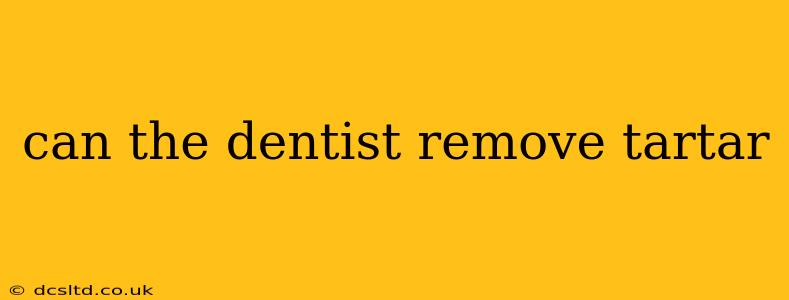Tartar, also known as dental calculus, is a hard, mineralized deposit that builds up on teeth. It's formed when plaque, a sticky film of bacteria, isn't removed through brushing and flossing. Over time, minerals from saliva harden the plaque, creating tartar. The crucial question many people have is: can the dentist remove tartar? The short answer is a resounding yes. Dentists are highly trained to remove tartar safely and effectively.
How Do Dentists Remove Tartar?
The primary method dentists use to remove tartar is scaling. This involves using specialized instruments, typically ultrasonic scalers or hand scalers, to scrape the tartar away from the tooth surface.
-
Ultrasonic Scalers: These devices use high-frequency vibrations to break up and remove tartar. They're efficient, less invasive, and often preferred for larger areas of tartar buildup. The vibrations also help disrupt the bacteria within the plaque, contributing to better oral health.
-
Hand Scalers: These are manual instruments that dentists use to carefully scrape away tartar. They are particularly useful for reaching hard-to-access areas and removing stubborn tartar deposits. The dentist will select the appropriate scaler based on the location and amount of tartar.
After scaling, the dentist will likely perform root planing. This process smooths the tooth's root surfaces, removing any remaining tartar or bacteria that may have infiltrated the gum line. Root planing helps prevent further tartar buildup and promotes gum health.
What Happens During a Tartar Removal Procedure?
The procedure is generally straightforward. Your dentist will first assess the extent of your tartar buildup. They might take X-rays to get a clearer picture of the condition below the gum line. Then, they'll begin the scaling and root planing process. While the process might feel a little uncomfortable, it's rarely painful, thanks to the use of local anesthetic. Post-procedure, you might experience some mild sensitivity, which your dentist can address.
How Often Should I Have My Teeth Professionally Cleaned?
While you can remove some plaque at home, professional cleaning is essential to remove hardened tartar. Most dental professionals recommend professional cleanings every six months, though some individuals might need more frequent appointments depending on their individual oral hygiene practices and risk factors. Regular cleanings are crucial in preventing gum disease and other oral health issues related to tartar buildup.
Does Insurance Cover Tartar Removal?
Most dental insurance plans cover at least a portion of the cost of professional teeth cleaning, including tartar removal. However, the specifics of coverage vary depending on your individual plan. It's best to contact your insurance provider directly to understand your coverage details.
What if I Don't Get My Tartar Removed?
Leaving tartar buildup untreated can lead to several serious oral health problems:
- Gingivitis: Inflammation of the gums, often characterized by redness, swelling, and bleeding.
- Periodontitis (Gum Disease): A more severe form of gum disease that can damage the gums and bone supporting your teeth, potentially leading to tooth loss.
- Bad Breath (Halitosis): Tartar harbors bacteria that contribute to persistent bad breath.
Can I Prevent Tartar Buildup?
Yes! The best way to minimize tartar formation is through diligent oral hygiene:
- Brush your teeth twice a day: Use fluoride toothpaste and proper brushing techniques.
- Floss daily: This helps remove plaque and food particles from between your teeth where your toothbrush can't reach.
- Use mouthwash: An antibacterial mouthwash can help control bacteria and reduce plaque.
- Regular dental checkups: Professional cleanings are essential for removing hardened tartar.
In conclusion, dentists are expertly equipped to remove tartar. Regular professional cleanings, combined with a diligent home oral hygiene routine, are vital for maintaining healthy teeth and gums, preventing serious oral health issues associated with tartar buildup. Don't hesitate to schedule a visit with your dentist if you have concerns about tartar or any other aspect of your oral health.
